Foods That Decrease Testosterone – Medically Reviewed by Dr. Zac Hyde M.D)
13 Foods Men Need to Avoid!
If you’ve ever tried to get fit, build muscle, or lose weight, you know that what you do is not nearly as important as what you eat.
That is, exercise and activity can make a difference, but what you actually put into your body determines about 80% of your results.
So, whether you’re trying to build testosterone or maintain your current levels, it’s essential that you consider your diet.
Understanding How Your Body Makes Testosterone
Testosterone is an anabolic steroid hormone that largely biosynthesizes from cholesterol.
Its manufacture is controlled by the brain, including the hypothalamus and pituitary glands.
However, it is actually made in the Leydig cells, which are located inside our testicles.
As most of us know, testosterone is the primary driver of male attributes. For instance, it controls the onset of puberty, the growth of facial, pubic, and body hair, and the deepening of our voice.
However, it is also responsible for muscle strength and size, bone density, sex drive, and sperm production.
In short: everything that makes a man a man is largely determined by our T level. And, like we said above, cholesterol is one of the primary ingredients our Leydig cells use to produce testosterone.
But there’s more to it than that. After all, simply having testosterone isn’t good enough – you need your body to use it.
For instance…
The Three Types of Testosterone
If the movie “Innerspace” taught us anything, it’s that the human body is far more complex than most of us know.
Unfortunately, for our discussion, testosterone is no different. You see, there are actually three different types of this hormone, with each being defined by where it is and what it’s doing.
- Free Testosterone. Free testosterone is the hormone’s purest form. Why? Because there are no proteins attached to it. Since it isn’t hindered by other molecules, it can enter cells and bind with and activate receptors at will. If you’re trying to boost your T levels, you’re basically trying to pump more of this into your bloodstream.
- SHBG-Bound Testosterone: It might sound shocking, but roughly half of your total T levels are usually stuck to a protein known as SHBG. This confusing acronym stands for sex hormone-binding-globulin. SHBG is produced in your liver and helps regulate your free testosterone levels. The problem is that SHBG is essentially “inactive,” so it can’t bind to receptors or boot any of the physical attributes listed above. Plus, if you have too much of it, it can reduce your levels of the beneficial free stuff.
- Albumin-Bound Testosterone: As you might have guessed, this term refers to testosterone that has become bound to a protein known as albumin. Like SHBG, Albumin is inactive and can’t be used to boost your sex drive or muscle growth. However, because the bind between the molecules is so weak, your body can actually convert ABT into free testosterone when needed.
As you can see, you can’t just talk about “testosterone” as if it’s all the same thing.
Too little free testosterone and too much SHBG will still affect your overall sexual health as much as having low T levels across the board.
To make matters worse, you can throw off your testosterone balance in a number of different ways.
Different Ways to Hinder Testosterone Production
If you’re young and healthy, you shouldn’t have to worry much about your free testosterone levels or the balance between your three types. However, as time goes on, a number of internal and external factors can affect our T factory.
Examples include:
- Testicular Injury and Infection – That ground ball that unexpectedly popped up at the last section? Those times you fell off your bike and went nards-first onto the top tube? Those injuries add up, and they can end up doing serious damage to your baby maker. Once you become sexually active, you can catch infections that, if left untreated, can cause big problems for your Leydig cells and testes in general.
- Medications – Pain relievers, opiates, SSRIs, and other medications that many of us are prescribed many times throughout our lives can negatively affect your testosterone production.
- Chemical Exposure – There is growing evidence that parabens, phthalates, phytoestrogens, and pesticides can damage your body’s ability to produce hormones. They can also damage the receptors to which your Free T is supposed to bind. This is frustrating, as you might have perfectly healthy levels but still suffer ill effects.
- Disease and Genetic Conditions – If you develop any hormone disorder or an issue with your pituitary or hypothalamus glands, it can seriously affect your ability to produce testosterone. The same goes for certain thyroid conditions and diseases like diabetes, liver disease, and autoimmune problems.
- Dietary Changes – Last, but certainly not least, changes in your diet can inhibit your body’s abilities to produce testosterone effectively in dozens of different ways. In the next section, we’ll expand on this point by talking about specific foods that can have this effect.
Foods that Decrease Testosterone Production
I’ve written a dozen articles or more on ways to boost your testosterone. In most of those cases, I mentioned specific foods and supplements you can take to boost your hormones.
But today, I want to talk about the foods that have the opposite effect. These are the things you put in your body that can reduce your testosterone if you eat them too often.
So, without further ado: here’s our list of the foods that decrease testosterone, including information about why they’re bad, and what you can eat instead.
1. Beer
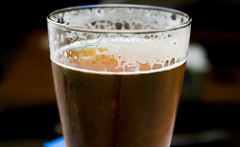
Alright, let’s go ahead and get this one out of the way. For those of you who bought the idea that swilling beer every day would turn you into some sort of German superman, I’m sorry to have to inform you about the untrustworthy nature of advertising.
Beer makes you fat and slow, and it can savage your body’s testosterone levels – especially when consumed often and in large amounts.
In fact, alcohol of all kinds has the ability to wreck your hormones (providing you drink enough).
Still, beer is the worst offender because of compounds found in the yeast and hops used to brew it.
So while it might still be considered “food” in some countries, treating beer as just another part of your meal can lead to big problems.
Why It’s Bad
I’ll be 100% honest with you: science has yet to pinpoint exactly why beer has such a crippling effect on our testosterone production.
But while we don’t really understand the mechanics behind it, there’s no debating the fact that it happens. If you look at some studies (which I’ve included below), it seems that beer encourages our bodies to produce estrogen at the expense of testosterone.
They’ve also found a correlation between heavy drinking and other lifestyle choices that reduce testosterone in men. All in all, if you’re the type to be downing a six-pack a night, you likely aren’t keeping up with the gym and eating right either.
How We Know
Three landmark studies have demonstrated this link between alcohol consumption and low testosterone:
- A 1987 study of rats and alcohol found not only that alcohol decreased testosterone but that the decrease corresponded directly to the amount of alcohol the rats consumed (source).
- Research into the hormone production of alcoholics vs. non-alcoholics in 2006 found that chronic drinkers had significantly more estrogen and less testosterone than light drinkers, who had more estrogen and less testosterone than non-drinkers.
- In Finland in 2013, researchers discovered that half a glass of vodka after a workout canceled out the testosterone-improving benefits of that exercise.
Try This Instead
First, the good news. The alcohol-low testosterone link is dose-dependent. That means you can have a pint occasionally without wrecking your testosterone levels or pumping up your estrogen into “man boob” territory.
That said, you can always do better. Choose your booze with care. Red wine and clear spirits are far less likely to zap your T levels out of existence. Ignore the commercials, guys. Beer is, without a doubt, the worst type of alcohol for your testosterone.
2. Factory-Farmed Meat
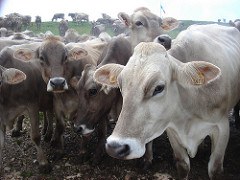
Good testosterone production relies on many nutrients found in beef and other meats. But there’s a right way and a wrong way to get your carnivore on.
In the old days, meat was provided to us on a local level. If you drove by a farm on your way to the grocery store, you were basically viewing the entire supply chain for your food.
Nowadays, meat is produced on a massive scale, with animals frequently shoved into pens in less-than-sanitary conditions.
To keep diseases from spreading like wildfire, “farmers” have to pump their animals full of antibiotics and other chemicals.
Why It’s Bad
Red meat (for example) is good for testosterone. It’s also great for muscle growth.
However, as we’ve already mentioned, factory-farmed meat is typically loaded with antibiotics, growth hormones, and other nasties that can wreak havoc with your testosterone production.
You don’t have to join PETA or go vegan to recognize that this is a problem.
How We Know
Way back in 1994, Dr. Soto and his team at Tufts University in Boston tested to see if the estrogen-increasing and testosterone-reducing impact of chemicals injected into factory farm livestock “passed through” to humans who ate it.
They found that not only did it pass through from livestock to humans, but also the chemicals sprayed on plants the livestock ate also passed all the way through to humans who consumed the meat.
Unfortunately, over the last 20 years, the use of factory farming methods and chemicals to treat livestock and feed plants alike has only increased.
Try This Instead
Source your meat from local, organic, cruelty-free farms that explicitly avoid factory farming methods.
You can go online or talk to your local butcher to ensure you’re getting the real deal and not falling for misleading on-package advertising.
Just know that you should expect to pay a bit more for this type of meat, as it’s much more expensive to produce.
Consider it an investment towards not taking testosterone treatments later on. Plus, it’s good karma.
3. Foods that Decrease Testosterone – Mint
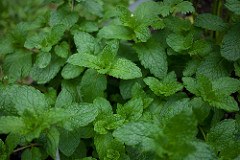
There are a lot of different mint products out there, from mint teas to those little cans of breath mints you take on a first date.
You’ll also find it in soaps, cough drops, shampoos, and toothpastes. It smells and tastes nice but isn’t so nice to your testosterone.
So if you’re the type of person who loves the wintry-fresh flavor of menthol, you could be putting yourself in a bad position when it comes to sexual performance.
Why It’s Bad
As with beer, the science isn’t exactly settled on what makes mint and mint products such a drain on your testosterone levels.
However, that doesn’t give you free rein to start pounding mojitos.
You see, as far as researchers can tell, spearmint causes “oxidative stress” to the hypothalamus. Y
ou might recognize this as the part of your brain responsible for regulating hormone production.
For whatever reason, the damage seems to make the hypothalamus reduce how much testosterone it tells the testicles to make, which directly reduces the amount of testosterone in your body.
How We Know
A 2008 study at the Indian Institute of Technology in Uttarakhand gave different doses of mint extract to rats, then examined the blood for testosterone and other indicators of testosterone production.
They found that rats who took the mint extract had significant reductions in testosterone itself. The mint also reduced sperm density in the rodents.
This study was followed up by a human trial done on women with excessively high androgen levels.
When the women were given two cups of mint tea a day for five days, they experienced a significant decrease” in Free Testosterone levels.”
Try This Instead
Start by avoiding mint-based cleaners and personal hygiene products. This can be hard with things like mint toothpaste, but as long as you spit and rinse, that’s not the end of the world.
You should also avoid those alcohol and mint-based mouthwashes, as they can affect your body’s ability to extract nitric oxide (which is essential to erections.
If you can, opt for citrus-based hygiene products instead. They have the same clean, cutting aroma without causing hormonal problems.
As for foods, it’s easy to just eat other stuff and leave mint sprigs out of your recipes.
4. Foods that Decrease Testosterone – Flaxseeds
If you pay attention to food trends, you probably know that flaxseed is the “new kale.”
That is, the health benefits have gotten overblown in the popular media, and now everybody and their hipster mother are adding it to every meal.
One thing is true, though: flax is high in omega-3 fatty acids, which have a variety of health benefits. However, those benefits are far outweighed by what flax can do to your testosterone production.
Why It’s Bad
Flaxseed, unlike other sources of omega-3 fatty acids, carries just a ton of lignan compounds.
We’re talking 800x as much as other options. If you’re behind on your chemistry, lignans are one of the most estrogenic things you can put into your body.
“Estrogenic” means “makes your body produce extra estrogen.” This is the opposite of what you want when you’re trying to boost your testosterone.
So the next time you see a “breakfast bowl” covered in flax seed for “texture,” you’ll know to avoid it (even if it has strawberries).
How We Know
Most of what we know about flaxseed and testosterone comes from research into treating conditions related to testosterone in the body.
These two studies, in particular, are great examples:
- In 2008, cancer researchers at the University of Texas used flaxseed supplements in an attempt to reduce testosterone in men with prostate cancer. They found that after 30 days, testosterone production dropped significantly.
- The following year, a team at Duke university used lignans in an attempt to help a woman with excessive facial hair, hoping to reduce the levels of testosterone causing the hair growth. The treatment dropped her free testosterone levels by 89%.
Try This Instead
This one’s simple: get your omega-3 fatty acids someplace else. Good sources include salmon, sardines, eggs, beef, halibut, and anchovies.
Vegetarians and vegans can get theirs from spinach, kale, winter squash, and walnuts. However, if you’re not pursuing flax for the health benefits, all you need to do is pay attention to the ingredients in your foods.
So the next time you get a smoothie, skip the flax seed and ask for a shot of protein instead. Your body will thank you.
5. Foods that Decrease Testosterone – Pesticide-Heavy Produce
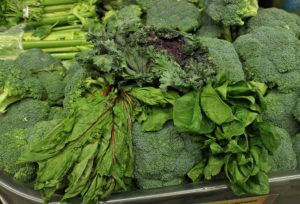
This one’s similar to what we said about factory-farmed meats. That is, it’s not the produce itself that causes a problem. It’s the crap they spray all over the produce.
Remember, producing foods the “old-fashioned way” is not very cost-effective. So, in order to protect those giant factory farms from bugs and other nasties, farmers just dump a ton of chemicals on top and call it a day.
Even if you wash your fruits and veggies, these pesticides can get into your system and disrupt hormone production.
Why It’s Bad
Again, farms use pesticides to drive away or kill bugs that would otherwise eat up their product.
However, those pesticides can’t be washed off as effectively or completely as you would want, leaving their compounds to roam free in your body once you eat them.
Even in small doses, those powerful chemicals can cause a whole range of health issues, and reduced testosterone is among them.
How We Know
Remember that study about factory farm chemicals passing through livestock and into the humans who consumed them?
Remember the part in that study that showed the chemicals passed from plants into livestock and then into people?
Dozens of other studies confirm this finding for the direct route of produce to people.
Those studies proved what humanity has known for centuries: don’t put nasty things on your food, then eat that food.
Try This Instead
This one has a simple solution as well: spend the extra cash and only buy organic fruits and vegetables.
If you happen to live in one of those places where organic is hard to come by, skip the grocery store entirely and see if you can find a farmers’ market nearby.
The smaller operations tend to be more traditional, and you can meet the people who grow the veggies to get direct info about chemical use.
6. Foods that Decrease Testosterone – Soy of All Kinds
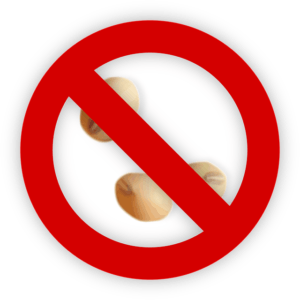
If you’re into healthy eating, you’ll bump into soy on a regular basis. It’s a cheap crop to grow, can be turned into literally hundreds of different foods, and can even replace good old cow’s milk.
And while loads of Asian cuisines rely on soy and soy products, until recently, Americans had little interest in consuming soy outside their local Chinese restaurant.
That was until the soy lobby started spending millions of dollars making health claims about the bean.
After that, it was in everything, and we all gobbled down tofu, miso soup, and tempeh with reckless abandon. But here’s the deal: soy is like kryptonite to testosterone production / erectile function.
Here’s why…
Why It’s Bad
Soy contains phytoestrogenic compounds that act in a similar fashion to estrogen in the human body. The theory goes that putting them in your body would have the same impact as ingesting pure estrogen.
As you hopefully know already, estrogen and testosterone have a see-saw relationship inside your body. If one goes up, the other goes down.
So if you’re pouring estrogen into your body every time you get a fancy latte or veggie meal, you’re doing serious harm to your hormones.
How We Know
Research has looked into this pretty deeply, since a lot of people eat soy and sexual health is a popular topic.
For example, a 2008 study by Dr. Basak’s team at the San Francisco Veterans Affairs Medical Center looked at the relationship between those phytoestrogenic compounds and androgen receptors in adult men (source).
They found that those compounds didn’t directly increase estrogen.
Instead, they tricked the body into “thinking” it already had enough testosterone, thus making the body produce less in response.
Try This Instead
Lots of people eat soy because it’s a “healthier” source of protein. If that’s your motivation, I recommend going for wild-caught fish, pastured eggs, or grass-fed beef instead.
These foods don’t have the estrogen-boosting effects you see with soy. In fact, many of them are known to boost testosterone production as well.
Life is a little harder if you’re a vegetarian since your protein options are drastically reduced. Seeds and nuts can provide some of your proteins, but I suggest you throw in as many beans as you can stand.
7. Certain Types of Oils & Fats
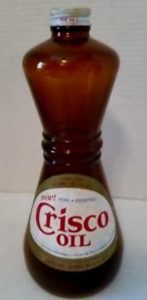
Oils and fats get a bad rap in general, but they’re one of our three “macronutrients” for a reason.
Unfortunately, not all of these oils are created equal.
That’s not to say that they’re all going to affect your testosterone. But if you want a “rule of thumb” regarding which ones do, you simply need to avoid oils that are liquid a room temperature.
Most of these are too high in omega-6 fatty acids, and too low in omega-3s.
Many of them also come in clear bottles, leading to oxidation of the oils themselves. As that oxidation starts to turn them, they become more harmful to your body.
Why It’s Bad
These oils — mostly vegetable oils — are typically very rich in polyunsaturated fats. These fats are the only kind of fat known to reduce testosterone production.
How We Know
Although research has confirmed or built on its findings before and after, the landmark study for this was performed in 1997 by a team at Pennsylvania State University.
This study of twelve men gave different subjects one of the four kinds of dietary fat before exercise.
They then tested blood testosterone after the workout and compared it to levels in the same men before they consumed the various fats
Their findings were just what I mentioned above. Monounsaturated fats and saturated fats all increased post-workout testosterone levels.
Only polyunsaturated fats reduced them.
Try This Instead
A small set of cooking oils are richer in the fats that increase testosterone: avocado oil, coconut oil, palm oil, and olive oil.
Use them instead of soy, cotton, flax, corn, and other polyunsaturated fats whenever possible.
Update: 6 More Foods That Decrease Testosterone
8. Red Reishi Mushrooms
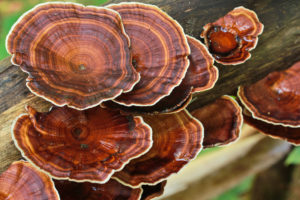
Red reishi mushrooms, also known as Ganoderma lucidum, are a fungus growing in hot and humid environments in Asia.
The fungus is popular in eastern medicine thanks to its benefits related to immunity, mental health, and blood sugar control.
Unfortunately, these mushrooms are among the foods that decrease testosterone.
Why It’s Bad
It’s unclear precisely why red reishi mushrooms impair testosterone production.
One likely explanation is that these mushrooms inhibit 5-alpha reductase (types of enzymes involved in androgen hormone synthesis).
The result is an inability to synthesize testosterone and convert it into the more potent dihydrotestosterone (DHT).
How We Know
A few years ago, researchers published a study examining the anti-androgen effects of compounds derived from plants.
Anti-androgens are compounds that inhibit the production of testosterone and other hormones.
Researchers looked at 20 species of mushrooms and found that Red reishi had the strongest anti-testosterone effects on the body.
The fungus inhibits testosterone production and can lead to a drop in DHT levels.
These effects appear to be so pronounced that researchers consider Red reishi a valid form of treatment for benign prostatic hypertrophy (BPH).
Try This Instead
The good news is that most people don’t even know about Red reishi mushrooms, so avoiding the food isn’t that big of an issue.
But, for those who enjoy their share of mushrooms, we recommend going with other species.
Shiitake, Lion’s Mane, White Button, Porcini, and Enoki mushrooms are all fantastic alternatives with excellent nutritional profiles.
9. Foods that Decrease Testosterone – Licorice
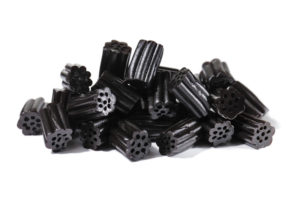
Licorice, also known as Glycyrrhiza glabra, is a herb native to parts of Asia and Europe.
The plant’s root is considered one of the oldest remedies, used as a treatment for stomach ulcers, indigestion, certain skin conditions, and respiratory issues.
The plant and root are rich sources of beneficial compounds with antioxidant and anti-inflammatory effects. As such, Licorice is claimed to possess potent anti-cancer properties.
Unfortunately, Licorice is another food that decreases testosterone and contributes to hypogonadism.
Why It’s Bad
Licorice contains large amounts of a compound called Isoliquiritigenin.
The compound is a botanical estrogen used as part of dietary supplements for its antioxidant, anti-inflammatory, and anti-tumor effects.
Unfortunately, Isoliquiritigenin possesses estrogenic properties and can inhibit steroidogenesis (the process of producing steroid hormones from cholesterol).
Like beer’s effect, Licorice could boost estrogen production at the expense of testosterone.
How We Know
In one study from 2003, researchers noted a 26 percent drop in mean testosterone values after a week of Licorice treatment.
These effects align with the proposed mechanisms of action, which you can learn more about in this paper.
While we certainly need more studies to be sure, I recommend staying away from the herb (and its root).
The estrogenic properties should be a big enough warning that consuming this herb in any form can lead to suppressed testosterone levels.
Try This Instead
There are many herbs with numerous health benefits that don’t seem to impair testosterone production. Among these, we have:
- Astragalus
- Garlic
- Ginger
- Turmeric
- Ginseng
10. Green Tea (Especially Green Tea Extract)
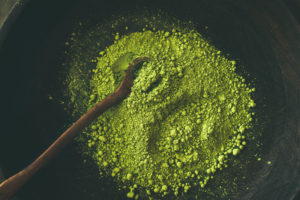
Green tea is often praised for its many health benefits, including:
- Cancer protection
- Fat oxidation
- Improved brain function
- Relaxation
- Reduction in type 2 diabetes risk
Unfortunately, all the potential benefits don’t matter much for men because green tea can lead to a drop in testosterone production.
Why It’s Bad
Green tea appears to have prominent effects on the male reproductive system.
Animal data suggests that green tea extract treatment reduces testicle size and weight in otherwise healthy rodents.
Unsurprisingly, testosterone levels drop after treatment compared to controlled groups (those not receiving green tea).
How We Know
A study from 2015 examined the effects of green tea leaf extract on male albino rats. Twelve rats were split into three groups:
- Group 1 – normal diet with sterile distilled water
- Group 2 – normal diet with 2.5 percent green tea extract
- Group 3 – normal diet with 5 percent green tea extract
All rats received a milliliter of liquid per 100 grams of weight.
After 26 days of treatment, researchers noted that the rats receiving green tea leaf extract experienced a reduction in testicular size and weight and a drop in testosterone levels.
Researchers concluded, “Result of this study showed that GTLE has potent castrative effect on male reproductive system in dose dependent manner.”
Try This Instead
Luckily, plenty of healthy teas have no adverse effects on the male reproductive system or testosterone levels. Among these, we have black, ginger and echinacea teas.
11. Foods that Decrease Testosterone – Soda – Soft Drinks
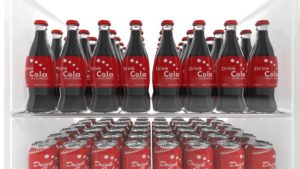
Soft drinks are full of sugar and unknown chemicals, contribute to weight gain, and can increase the risk of type 2 diabetes, cardiovascular disease, and more.
Diet (sugar-free) soda is probably a better option, but we still need more research on the potential long-term effects.
Why They Are Bad
Sugary beverages are the number one source of sugar in most people’s diets. Though seemingly harmless, these beverages contain lots of calories, and regular consumption leads to a wide range of adverse effects:
- Chronic inflammation
- Cardiovascular disease
- Type 2 diabetes
These drinks can also impact men’s reproductive system. It isn’t a stretch to assume that regular soda consumption can prevent Leydig cells from producing adequate amounts of testosterone.
How We Know
A 2018 study examined the link between sugar-sweetened beverage intake and serum testosterone levels in men between 20 and 29.
Data from the paper suggests that men who drink sugary beverages are more likely to have a higher body mass index (BMI) and lower testosterone levels.
Try This Instead
The great news is that you can pick from various alternatives. Sugar-free soda is an obvious choice because it lacks sugar and doesn’t contribute to weight gain.
Other options include:
- Water
- Black coffee
- Tea
12. Foods that Decrease Testosterone – Trans Fats
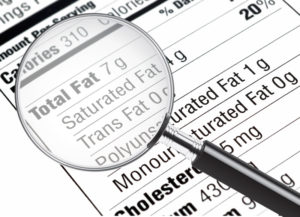
Trans fats are a form of artificial nutrient added to many processed foods today.
From your favorite cookies and ice cream to microwave popcorn and fried chicken, trans fats are everywhere and pose a considerable threat to our health.
There is no good reason to consume trans fats.
Research finds no health benefits to consuming them and suggests that regular intake can increase the risk of several diseases.
Why They Are Bad
Research suggests that trans fats can influence testicular function, impair sperm production, and lead to a drop in testosterone levels.
The exact mechanisms behind these effects are yet to be understood, but we have data from human trials, which is enough to make an informed decision.
How We Know
One study from 2017 examined the relationship between certain fatty acids and testicular function in young men.
The subjects filled out questionnaires on lifestyle and habits, and each underwent a physical examination.
Researchers noted that a higher intake of omega-6 fatty acids and trans fatty acids was correlated with lower testicular size, impaired testicular function, and lower levels of androgen hormones.
Try This Instead
Not all fatty acids are harmful to us. In fact, getting enough dietary fat is crucial for hormonal health, brain function, nutrient absorption, and more.
Here are some excellent sources of good fats:
- Eggs
- Avocado
- Extra virgin olive oil
- Nuts
- Fatty fish
- Dark chocolate
13. Deep Fried Foods
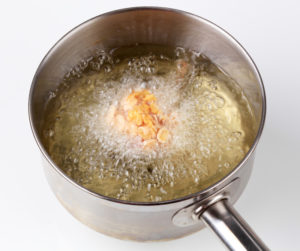
Fried foods have always been in the crosshairs of health-conscious people.
French fries, deep-fried chicken, corndogs, and other goodies are notorious for their effects on our health, weight, and well-being.
Unfortunately, there are plenty of fried foods that decrease testosterone.
Why They Are Bad
First, fried foods are often abundant in trans fatty acids, which, as discussed in the previous point, can impair testicular function and lead to a drop in androgen hormones.
Second, fried foods are correlated with a higher BMI, which can contribute to the drop in testosterone levels.
Additionally, many fried foods are heavily processed and contain chemicals with unclear effects on the body.
While this is mostly guesswork, it isn’t a stretch to assume that some of these artificial compounds can impair testicular function.
How We Know
One study published in 2019 looked at dietary eating patterns, testosterone levels, and the severity of impaired kidney function in men older than 40.
Among their findings, the authors noticed a link between processed-fried food intake and lower testosterone levels.
Further, men consuming fried foods consistently were more likely to experience poor kidney function.
Try This Instead
Frying might seem the only good way to make food tastier and more succulent, but that isn’t the case.
These fantastic alternatives are steaming, grilling, baking, roasting, stewing, and stir-frying.
For instance, instead of eating fried potatoes, bake them in an oven. Using the right spices and condiments can make the potatoes taste great and with a third of the calories.
Diets That Reduce Testosterone Levels
Low-Carb Diets
Low-carb and ketogenic diets have become incredibly popular for people looking to shed weight and improve their health.
Unfortunately, extremely low-carb intakes are associated with a drop in testosterone levels.
Low-Fat Diets
Dietary fats are often claimed to increase cholesterol, clog up our arteries, and put us at a high risk of cardiovascular disease, heart attack, and stroke.
People often use low-fat diets to lose weight, but doing so can lead to a drop in testosterone levels.
According to most guidelines, at least 20 to 25 percent of your daily calories should come from healthy fat sources.
As research grows, we become more aware that not all fats are bad.
Trans fatty acids can lead to numerous health issues, including a drop in testosterone levels, but plenty of healthy alternatives exist.
Starvation Diets
Many people fall for the trap of crash dieting to reach their weight loss goals quickly. Unfortunately, doing so can lead to a significant drop in testosterone levels.
For instance, in one paper, researchers noted a significant correlation between weight loss and a lower body fat percentage to suppressed testosterone levels in amateur wrestlers.
Slower weight loss doesn’t seem to have the same adverse effect on testosterone levels, and the hormone begins to decline once a person’s body fat dips below 10 to 12 percent.
Foods that Decrease Testosterone – Conclusion:
Your mission (should you choose to accept it) is to cut as many of these foods out of your diet as you are willing to.
Replace them with the foods I recommend above.
You’ll see better results if you eliminate the estrogenic foods and put more pro-testosterone herbs and foods into your diet.
It’s like increasing your bank account: spending less OR earning more both work, but combining the two delivers optimal results.
Finally, if you’re a tea drinker, make sure you read this.
